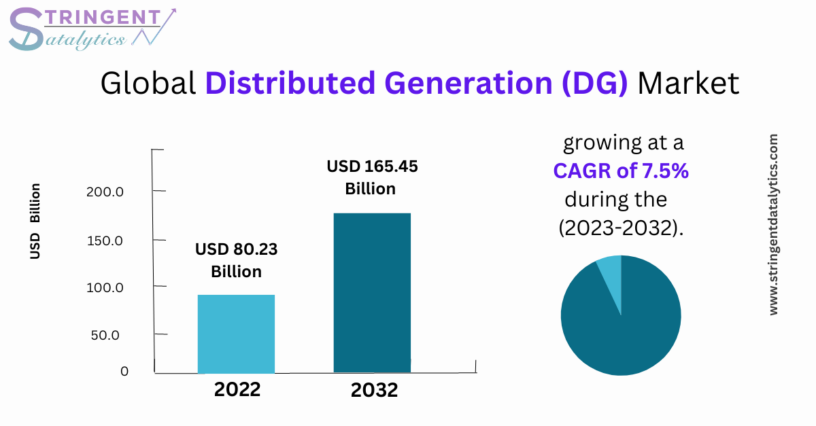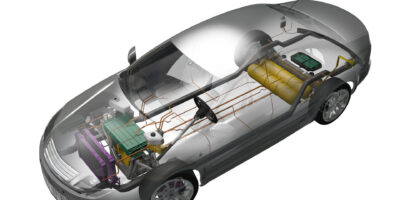Distributed Generation Market was USD 80.23 Billion in 2022 and is expected to reach USD 165.45 Billion in 2032 growing at a CAGR of 7.5% during the Forecast Period (2023-2032).
The Distributed Generation (DG) Market refers to the segment of the energy industry that focuses on small-scale power generation technologies deployed close to the point of consumption. Unlike centralized power plants, distributed generation systems produce electricity on-site or near end-users, often reducing transmission and distribution losses while supporting energy independence and sustainability goals. Key technologies include solar PV, wind turbines, fuel cells, combined heat and power (CHP) systems, and microturbines.
Market Drivers
- Energy Transition to Renewables: Governments and industries are prioritizing renewable energy adoption to meet climate targets, boosting investments in solar, wind, and other DG technologies.
- Declining Costs of Renewable Technologies: The falling cost of solar panels, wind turbines, and battery storage systems makes DG technologies more affordable and accessible.
- Energy Resilience and Reliability: Growing concerns over power outages and the need for resilient energy systems are driving DG adoption for on-site power generation and storage.
- Government Incentives and Policies: Subsidies, tax incentives, and net metering policies support the deployment of DG systems globally.
- Grid Modernization and Decentralization: Utilities are integrating distributed energy resources (DERs) to modernize grids, reduce transmission losses, and enhance flexibility.
- Demand for Off-Grid and Remote Power Solutions: Distributed generation is a key solution for rural electrification and powering remote industrial operations.
Market Challenges
- Regulatory and Policy Barriers: Inconsistent policies and regulations across regions can hinder the adoption of DG technologies.
- Grid Integration Issues: Managing distributed energy resources (DERs) and integrating them into existing grid infrastructure can be technically challenging.
- Initial Capital Investment: Despite declining costs, the upfront investment for DG systems remains a barrier for some customers.
- Intermittency of Renewables: Solar and wind power generation depend on weather conditions, requiring energy storage or hybrid systems for reliability.
- Competition from Centralized Power: In regions with abundant and affordable centralized power, DG technologies may face slower adoption.
Future Trends
- Integration of Energy Storage: As battery storage costs decline, integrating storage with DG systems will enhance reliability and enable the use of renewables even during non-peak generation times.
- Microgrids and Virtual Power Plants (VPPs): The development of microgrids and VPPs will allow for better control and aggregation of distributed energy resources, improving grid stability.
- Hybrid DG Systems: Combining multiple technologies, such as solar, wind, and energy storage, will become more common to overcome intermittency challenges.
- Blockchain for Energy Trading: Blockchain technology will enable peer-to-peer energy trading in decentralized energy systems, increasing the economic viability of DG.
- Rural Electrification and Emerging Markets: Distributed generation will play a critical role in bringing electricity to underserved and off-grid communities in developing regions.
- Smart Energy Management: The rise of IoT and AI-driven solutions for monitoring and optimizing DG systems will improve efficiency and reduce costs.
Conclusion
The Distributed Generation Market is poised for significant growth as energy systems transition toward decentralized and renewable models. The adoption of DG technologies not only supports energy independence and sustainability goals but also addresses the need for resilient and reliable power solutions. With advancements in technology, supportive government policies, and increasing public awareness, the DG market will play a pivotal role in shaping the future of energy.
Click Here, To Get Free Sample Report https://stringentdatalytics.com/sample-request/distributed-generation-(dg)-market/12512/
Market Segmentations:
Global Distributed Generation (DG) Market: By Company
• Alstom
• E.On. Se
• Caterpillar Power Plants
• Siemens Energy
• Doosan Fuel Cell America
• Ballard Power Systems
• General Electrical Power
• Sharp Corporation
• Enercon
• Bloom Energy
• Capstone Turbine Corporation
• Fuel Cell Energy
• Opra Turbines
• Rolls-Royce Power Systems
• Mitsubishi Hitachi Power Systems
Global Distributed Generation (DG) Market: By Type
• Solar Photovoltaic
• Wind Turbine
• Reciprocating Engines
• Micro Turbines
• Fuel Cells
Global Distributed Generation (DG) Market: By Application
• Residential
• Commercial
• Industrial
Global Distributed Generation (DG) Market: Regional Analysis
The regional analysis of the global Distributed Generation (DG) market provides insights into the market’s performance across different regions of the world. The analysis is based on recent and future trends and includes market forecast for the prediction period. The countries covered in the regional analysis of the Distributed Generation (DG) market report are as follows:
North America: The North America region includes the U.S., Canada, and Mexico. The U.S. is the largest market for Distributed Generation (DG) in this region, followed by Canada and Mexico. The market growth in this region is primarily driven by the presence of key market players and the increasing demand for the product.
Europe: The Europe region includes Germany, France, U.K., Russia, Italy, Spain, Turkey, Netherlands, Switzerland, Belgium, and Rest of Europe. Germany is the largest market for Distributed Generation (DG) in this region, followed by the U.K. and France. The market growth in this region is driven by the increasing demand for the product in the automotive and aerospace sectors.
Asia-Pacific: The Asia-Pacific region includes Singapore, Malaysia, Australia, Thailand, Indonesia, Philippines, China, Japan, India, South Korea, and Rest of Asia-Pacific. China is the largest market for Distributed Generation (DG) in this region, followed by Japan and India. The market growth in this region is driven by the increasing adoption of the product in various end-use industries, such as automotive, aerospace, and construction.
Middle East and Africa: The Middle East and Africa region includes Saudi Arabia, U.A.E, South Africa, Egypt, Israel, and Rest of Middle East and Africa. The market growth in this region is driven by the increasing demand for the product in the aerospace and defense sectors.
South America: The South America region includes Argentina, Brazil, and Rest of South America. Brazil is the largest market for Distributed Generation (DG) in this region, followed by Argentina. The market growth in this region is primarily driven by the increasing demand for the product in the automotive sector.
Click Here, To Buy Premium Report https://stringentdatalytics.com/purchase/distributed-generation-(dg)-market/12512/?license=single
Key Indicators Analysed
Market Players & Competitor Analysis: The report covers the key players of the industry including Company Profile, Product Specifications, Production Capacity/Sales, Revenue, Price and Gross Margin 2016-2027 & Sales with a thorough analysis of the market’s competitive landscape and detailed information on vendors and comprehensive details of factors that will challenge the growth of major market vendors.
Global and Regional Market Analysis: The report includes Global & Regional market status and outlook 2016-2027. Further the report provides break down details about each region & countries covered in the report. Identifying its sales, sales volume & revenue forecast. With detailed analysis by types and applications.
Market Trends: Market key trends which include Increased Competition and Continuous Innovations.
Opportunities and Drivers: Identifying the Growing Demands and New Technology
Porters Five Force Analysis: The report provides with the state of competition in industry depending on five basic forces: threat of new entrants, bargaining power of suppliers, bargaining power of buyers, threat of substitute products or services, and existing industry rivalry
About Stringent Datalytics
Stringent Datalytics offers both custom and syndicated market research reports. Custom market research reports are tailored to a specific client’s needs and requirements. These reports provide unique insights into a particular industry or market segment and can help businesses make informed decisions about their strategies and operations.
Syndicated market research reports, on the other hand, are pre-existing reports that are available for purchase by multiple clients. These reports are often produced on a regular basis, such as annually or quarterly, and cover a broad range of industries and market segments. Syndicated reports provide clients with insights into industry trends, market sizes, and competitive landscapes. By offering both custom and syndicated reports, Stringent Datalytics can provide clients with a range of market research solutions that can be customized to their specific needs.
Contact Us
Stringent Datalytics
Contact No- +1 346 666 6655
Email Id- sales@stringentdatalytics.com




Leave a Reply